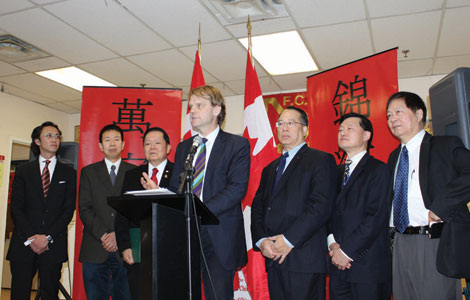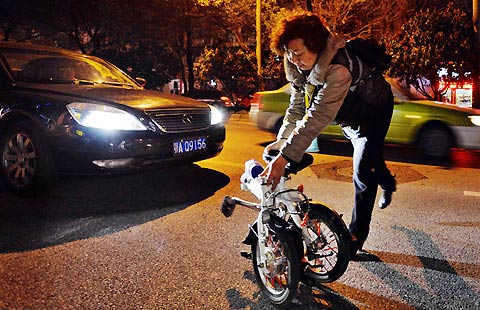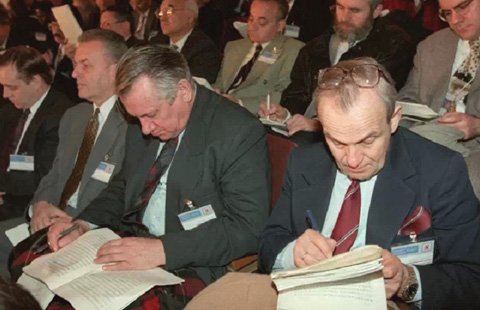Timetable revealed for environment tax
Updated: 2015-03-12 19:05
(Xinhua)
|
|||||||||
BEIJING - Chinese authorities have a timetable for implementing a system of taxing polluters, a senior law researcher has revealed.
The long-awaited tax, which will replace the current administrative penalties that are widely seen as ineffective, will be ushered in after the law behind it is finalized.
The draft law is due to be submitted to the Standing Committee of the National People's Congress at the end of this year, after it is first made available to the public to solicit their views, Sun Youhai, director of the China Institute of Applied Jurisprudence of the Supreme People's Court, told Xinhua on Wednesday.
Sun said he learned the timetable from the Legislative Affairs Office of the State Council, which has been considering the draft law since receiving it in March 2013 from the Ministry of Finance (MOF), the State Administration of Taxation and the Ministry of Environmental Protection.
Premier Li Keqiang touched on the tax legislation in his government work report last Thursday.
Backed by comprehensive regulation and collected by taxation authorities, the tax will be more powerful in discouraging companies from polluting and will fuel investment in the green industry, experts believe.
Under the current system, environmental watchdogs are tasked with charging companies for pollution, but they have been ineffective in doing so.
In 2013, China should have levied pollutant discharge fees totaling 57.5 billion yuan (about $9.2 billion), but less than 40 percent of the sum was collected, according to Jia Kang, former head of the Research Institute for Fiscal Science under the MOF.
Under the draft law, the tax will be levied based on emissions of sulfur dioxide, nitrogen oxides, dust and ammoniacal nitrogen, as well as chemical oxygen demand.
Companies will be inspired to invest in anti-pollution technology, boosting this nascent sector and providing a new growth point for the economy, said Professor Lan Hong at Renmin University's School of Environmental and Natural Resources.
China's investment in environmental protection is far below the internationally-recognized standard of 3 percent of GDP needed to improve the environment, according to Wang Canfa, director of an environmental research body under the China University of Political Science and Law.
Despite the high hopes, Finance Minister Lou Jiwei said on the sidelines of the parliamentary session that the tax is not a panacea to pollution woes and will not became a major source of government revenue.
Environmental minister Chen Jining told a press conference earlier this month that China is facing a development-environment conflict that is "unprecedented in human history".
Several experts interviewed by Xinhua said they believe the country's pollutant discharge will peak around 2020 and a turning point in environmental quality can only be expected around 2030.
"We're in the dark before the dawn," said Luo Jianhua, secretary general of the China Environment Chamber of Commerce.
- Hebei province says paying 'huge price' in war on pollution
- Clearing air pollution won't be done in a day
- Law to combat soil pollution expected this year
- Deputy: Pollution control should be part of officials' evaluation
- Beijing to shut down 300 factories to curb air pollution in 2015
- Pollution fight calls for emissions cuts

 Picturesque scenery of red earth in Yunnan
Picturesque scenery of red earth in Yunnan
 Across Canada March 13
Across Canada March 13
 Night life with a difference
Night life with a difference
 Top 8 symptoms of being a smartphone addict
Top 8 symptoms of being a smartphone addict
 Christie's to auction landmark Chinese collection
Christie's to auction landmark Chinese collection
 Chinese manufacturers keeping Apple Watch ticking
Chinese manufacturers keeping Apple Watch ticking
 Hutong culture captured on porcelain plates
Hutong culture captured on porcelain plates
 Foreigners at the 'two sessions' over the years
Foreigners at the 'two sessions' over the years
Most Viewed
Editor's Picks

|

|

|

|

|

|
Today's Top News
Nation open to US pivot
Small Chinese firms discovering OTCBB market
Tencent, US firm join on e-books
Strong US dollar impacts world trade
Two officers shot outside Ferguson police HQ
Clinton brings Benghazi panel back in spotlight
Prudent monetary policy continues
Reproach for wrongful convictions
US Weekly

|

|








